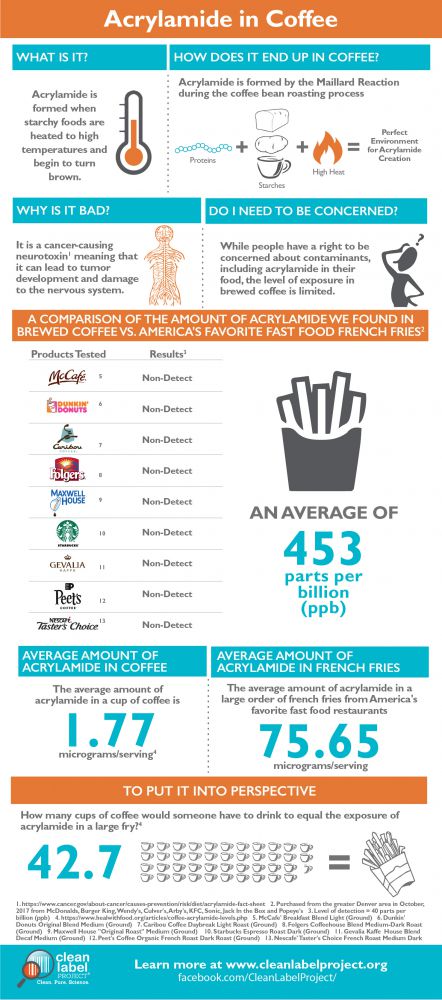You may have already heard the rumours that coffee apparently causes cancer, but rest assured that this is most likely a storm in a teacup! In March 2018, Los Angeles Superior Court Judge Elihu Berle ruled that all coffee sold in the state of California needs to come with a cancer warning label because coffee contains acrylamide – a potential cancer-causing chemical. But while the judge’s decision is in line with the law, many are claiming that it isn’t in line with the science…
So, is coffee actually bad for your health? The carcinogen in question, acrylamide, is a neurotoxin that’s found in almost every food that’s cooked at a high temperature, like fried potatoes and your morning slice of toast. It’s produced naturally during the coffee roasting process, and the experts are saying that the miniscule amount of acrylamide in your cup of coffee is harmless.
Possibly … potentially …
All the fuss stems from a single study on rodents, where extremely high doses of acrylamide seemed to cause increased cases of cancer, but again, only in rodents. The quantities that humans would have to consume would be massive (and unrealistic) – much, much more than even the most dedicated coffee fanatic could consume.
The World Health Organisation (WHO) actually removed coffee from its list of cancer-causing agents in 2016 because there was no conclusive evidence to suggest that coffee had any kind of carcinogenic effect on people. The cancer-causing claims are at odds with all the scientific studies that have shown the numerous health benefits of drinking coffee. There’s even a growing body of research that coffee possibly prevents several kinds of cancer. It’s all very confusing…
Who to believe?
The problem with the lawsuit is that the burden of proof was on the coffee industry to prove that the levels of acrylamide in coffee don’t pose a significant health risk. Unfortunately, it’s nearly impossible to prove that acrylamide doesn’t cause cancer because of this requirement in the California state law, known as Proposition 65:
“For chemicals that are listed as causing cancer, the "no significant risk level” is defined as the level of exposure that would result in not more than one excess case of cancer in 100,000 individuals exposed to the chemical over a 70-year lifetime.”
A study to get to that level of certainty would be impossible to conduct. The law is controversial – maybe coffee causes cancer, maybe it reduces the risk of cancer? It doesn’t seem like cause for concern given that there’s no definitive proof (we’re not rats and we don’t eat isolated acrylamide in gigantic doses), so I wouldn’t be inclined to give up my daily shots of caffeine goodness anytime soon.
Dr Alessandro Craparo PhD of Science of Coffee agrees,
"Just note I am a climate scientist that works on coffee (mostly from the plant growth side), not really medical health side, but my two cents worth is that essentially there is nothing to worry about. Latest research on linking coffee to cancer is still unclear and the level of carcinogenicity is “unclassifiable”. The carcinogen in question is called Acrylamide (formed during roasting), it is still classified as “probable carcinogen” and is also found in French fries, toasted bread, potato chips, crackers, biscuits, cereals and tobacco. Lots of other stuff I would cut before coffee!! On the flip side, there are conclusive health benefits to drinking coffee which have been published in reputable journals and may very well outweigh the “unclear” risks."
If you’re still unsure, check out this overview of a study by Clean Label Project. They ran an experiment to better understand the acrylamide exposure risk from brewed coffee, and the results are reassuring!
